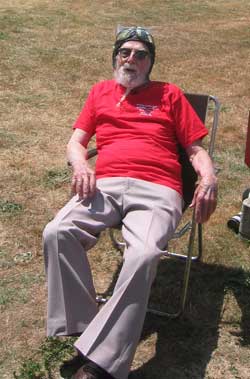My wife’s grandfather died last week. He was 96 years old and had not shaved his beard in 30 years. Lately he’d taken to carrying business cards with his name and title printed on the front: Stephen Edward Eastman, W.O.M.
“W.O.M.?” I asked him. “Weird Old Man,” he explained.
We called him Pop. Pop was unsinkable. He never complained, was up for anything, and snored like a huge zipper being unzipped and rezipped every few seconds. He’d seen the Depression, World War II, astronauts walk on the moon, and granddaughters turn 40, but his enthusiasm for life never waned. At 96, he still used dozens of exclamation points in his letters, still took pleasure in the smooth polish of worn pebbles, still started stories by saying, “Hey, man!”
We’ve all seen the punch-lists for old folks hoping to stay young: Enjoy each day, take care of your body, keep an open mind, try new things.
Pop was the poster boy for these sorts of lists. On his 94th birthday, he leapt out of an airplane strapped to a skydiving instructor and free-fell for a mile. For his 95th birthday, he screamed up a stretch of the Columbia River in a jetboat. “Pulled 2 1/2 Gs,” he told us.
He planned to fly a hot air balloon over Seattle; he wanted to market jewelry made from human hair to Playboy. He spent months writing letters to the Blue Angels trying to convince them to take him on a flight.
He drank a quart of black tea every morning, regularly ate sour cream and pickles for dinner, and devoured whole boxes of See’s candy for dessert. He enrolled in the Renton, Washington Police Citizen’s Academy at age 93 and took a class in hostage negotiation. He had his bank account number tattooed on the back of his hand so he wouldn’t forget it. The last letter he sent us was a thank you for getting him postage stamps with his face on them from zazzle.com.
“Your stamps,” he wrote, “have unleashed a tsunami of major proportions here at the Chateau. Being a stone-age denizen and not knowing the internet from a fish, can I impose on you to purchase an additional 200 of your masterpieces for me?”
As recently as last year, Pop and his 91-year-old girlfriend would drive her Buick onto the logging roads around Mount Rainier to, in his words, “look around.”
“I don’t watch TV,” he told us one day a couple of years ago. “Except for the local news.” But that very night, he watched the whole of Survivor and did not say anything for 50 minutes, until just before the tribal council, when he told my wife, “I’m getting into this.”
It’s June now in Idaho, the cottonwood fluff flying over the river and the skies taking on that deep, fixed blue of summer. This is the first June since June, 1911, that the world has not had my wife’s grandfather in it.
My three-year-old twin sons—Pop’s great grandsons—are crouched in our driveway, poking strips of sun-softened tar with their fingers.
“Guys,” I say, “let’s go. I’ve told you three times.” I stand over them and clap my hands. “You guys need to learn how to pay attention.”
They don’t even bother to look up. Usually I would grab them, wrestle them into the car. But today I realize: They are paying attention. They’re paying attention all day long: to tar in the driveway, to a roll of packing tape, to a girl out the window on her bicycle. I’m the one too busy filtering out the world, hurrying to some appointment or another, paying no attention to the things right in front of my face. Meanwhile, my kids are discovering new continents all day long.
“I don’t know where to look,” Pop told us once, as we walked along a beach in San Diego. “There’s so much to see.”They drive their fingers deeper into the tar, then pull back and laugh as the tar rebounds to its original shape. They try jabbing sticks into it; they take off their shoes and press their toes into it. Watching them, I can’t help but think of Pop, his blood whispering down through the generations: the way he would rub the leaves of a plant between his fingers, or pronounce a word like “verdigris” with deep, genuine relish.
“I don’t know where to look,” Pop told us once, as we walked along a beach in San Diego. “There’s so much to see.”
It was as if, in his last years, he had been afflicted with what the poet Tom Andrews called Attention Surplus Disorder. Rather than feel as if he had seen it all, the world simply got more and more interesting to him.
Curiosity. Inquisitiveness. In Pop’s world, as in my sons’, everything warranted investigation. Nothing was uninteresting.
Eventually, I coax my sons into the car and drive them to the park and release them like hounds into the grass. They sprint toward the playground equipment and yell, “Running! Running!” As I watch them, the shadows of leaves flickering over the grass, the afternoon seems so precious that I wonder, only partly in jest, if I ought not to spend the rest of the week doing only this: watching my sons, watching the light falling through the trees. As if every minute spent doing something else would be a minute wasted.
To the right of the steering wheel in Pop’s car was a hand-lettered sign: “Don’t go ogling at babes. Pay attention.” In a culture that worships youth, that sometimes has a hard time facing up to death, maybe the key to staying young is simply that: Pay attention.



